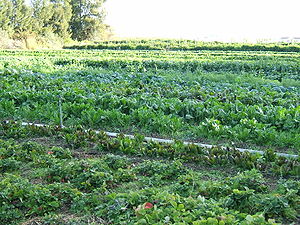The Politics of Food
My mama said “Whatever you do, don’t discuss politics or religion at the dinner table. It’s not good manners. Nor is it good for your digestion.”
I took her advice to heart. But these days, it’s hard not to think about the politics of the very food we’re trying to enjoy every evening at dinnertime.
The Cornucopia Institute sent me some information that I found rather disturbing. In the past, farmers have been sued by Monsanto, a Fortune 500 biotech firm specializing in genetically modified organisms, for intellectual property infringement. In essence, organic farmers and other conventional crop owners have been accused of stealing Monsanto’s proprietary seed rather than purchasing news seeds. It’s really a mess because cross-pollination could have been the reason it happened (although who can really tell). To get the story right, I’m copying part of the email I received:
Over the years Monsanto has sued farmers alleging they have stolen the corporation’s intellectual property by saving their proprietary seed rather than purchasing new seed each year that would include a “technology fee.” Because pollen, and genetics, can be spread through the wind, or by insects, farmers are vulnerable to having their crops contaminated and then subsequently being sued by Monsanto.
Soon after the March filing of the lawsuit, Monsanto issued a statement saying that they would not assert their patents against farmers who suffer “trace” amounts of transgenic contamination. In response, and in the hope that the matter could be resolved out of court, PUBPAT attorneys wrote Monsanto’s attorneys asking the company to make its promise legally binding.
The biotechnology giant responded by hiring former solicitor general, Seth P. Waxman, a partner in the Washington, D.C. office of WilmerHale. Waxman completely rejected PUBPAT’s simple request and instead confirmed that Monsanto may indeed make claims of patent infringement against organic farmers whose fields become contaminated by Monsanto’s genetically modified seed. (Copies of both the letter written by PUBPAT to Monsanto and the response letter by Waxman can be found at: http://www.pubpat.org/assets/files/seed/OSGATA-v-Monsanto-Complaint.pdf).
“Monsanto has run roughshod over organic and conventional farmers who have chosen to be sensitive to consumers’ concerns, and marketplace demand, by shunning genetic engineering in their seed purchases and the crops they produce,” said Mark A. Kastel, Codirector of The Cornucopia Institute, a co-plaintiff in the suit with over 4,000 members, most of whom are organic farmers. “Because of Monsanto’s massive investments in federal political campaigns, and in lobbying, it’s important that an independent judiciary protects citizen-farmers from intimidation.”
“Monsanto’s letter was a completely empty, indefensible, and self-evident evasion that shows they are only interested in trying to spin propaganda and do not want to take serious steps to resolve the problem they have created for organic and non-transgenic agriculture,” said one of the co-plaintiffs in the suit, Don Patterson of Virginia.
“The seriousness of the issues being engaged in this case requires a constructive and socially-acceptable response from the defendant in the public interest,” added Maine farmer Jim Gerritsen, President of Organic Seed Growers & Trade Association, the lead plaintiff in the suit. “In the absence of that, we reassert the essential importance of the arguments stated in March and reinforced now by the additional evidence of Monsanto’s intransigence. Monsanto’s utter failure to act reasonably to address our concerns has only reaffirmed the need for our lawsuit.”
In addition to supplementing the complaint with Monsanto’s most recent actions, PUBPAT announced that a new group of 23 organizations, seed companies, and farms or individual farmers have joined the original plaintiffs in the suit bringing the total number of plaintiffs to 83, comprising 36 organizations, 14 seed companies, and 33 farms and farmers.
When discussing this with my biotech husband, we got into a bit of a pickle with each other. At the dinner table.
So yes, Mama, you’re right. Food and politics don’t mix. It’s a heady, heated subject that isn’t going away. When I buy organic food, I want to be sure it isn’t some mutant meal mixed with manipulated seed.
What do you think about genetically engineered food?


willowdrinkwater
June 4, 2011 at 2:02 amAh, yes…the dinner table discussions can get uncomfortable when you don’t follow momma’s rule. I understand the conflict between the scientific mind wanting to improve on God’s creation. We are overpopulating our planet big-time…and many problems come from it. There is a balance we can attain however, and it starts with listening to all points of view. Glad we have a family that speaks its mind! Make mine organic. It tastes better.